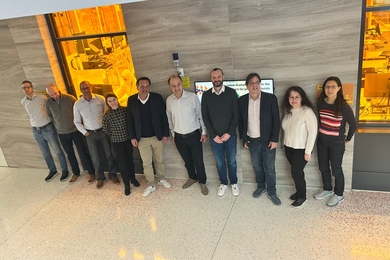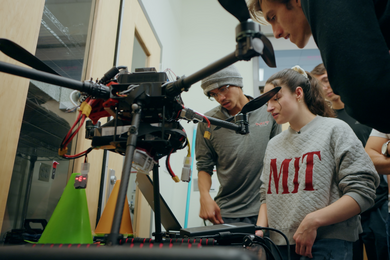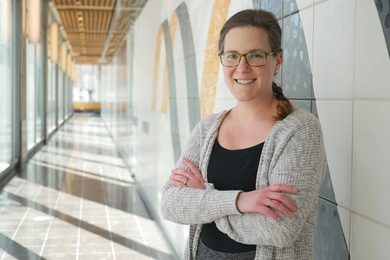Andrei Tokmakoff, assistant professor of chemistry, is one of 24 researchers nationwide to receive a fellowship from the David and Lucile Packard Foundation. The foundation, in one of the nation's largest nongovernmental programs of unrestricted grants for young university faculty in science and engineering, has awarded $15 million in fellowships to provide recipients with $125,000 apiece per year for five years to support their scientific research. Professor Tokmakoff says the money will support development of experimental methods that can observe how molecular structure changes in solution.
"We irradiate a sample with several femtosecond pulses that are short enough to effectively freeze a transient molecular structure, and we should be able to tell you how different bonds of the molecule are placed relative to each other at that moment in time," he said. "We want to use this to study time-dependent chemical processes, like peptide and protein folding, and how the structure of liquid water changes."
---------------------------
Nancy Hopkins, the Amgen Professor of Biology, and members of the First Committee on Women Faculty in Science received the Beacon Award from the University of Pennsylvania's Trustees Council on Penn Women in late October.
The award pays tribute to a person or persons whose efforts and achievements promote women's interests. "We believe that the ground-breaking study that you and your colleagues at MIT conducted merits the recognition of the Beacon Award," wrote Judith Rodin, president of University of Pennsylvania.
In addition, Professor Hopkins was named one of the Patriots' Trail Girl Scouts Council's Leading Women for 2000. The awards were founded in 1992 to acknowledge the unique achievements of women who have made outstanding contributions in their fields. The Patriot's Trail Council serves more than 30,000 girls in Boston and 65 other cities and towns.
---------------------------
������
Michael Noga, mathematics librarian and collections manager at the Science Library, has been elected vice president/president-elect of the Geoscience Information Society, an international organization created to improve the exchange of information in the earth sciences. Mr. Noga will take office this month as vice president and serve one year in that capacity before taking a term as president of the organization. The society encourages interaction and cooperation among scientists, librarians, editors, cartographers, educators and information professionals.
---------------------------
The MIT Model United Nations Society has won awards at four of the six conferences attended by its members since its founding less than two years ago. Last month Kishore Kuchibhotla, a junior in physics, and Raj Krishnan, a junior in electrical engineering and computer science, won best delegate awards in the Security Council Simulation at Yale University. Freshman Rupesh Kanthan received an honorable mention. The four-member MIT team beat 12-person teams from Harvard, the University of Chicago, Georgetown and West Point, schools with some of the best international relations programs in the country. Leela Ramnath, a junior in economics, was the fourth representative of the MIT team at the simulation.
A version of this article appeared in MIT Tech Talk on November 8, 2000.





